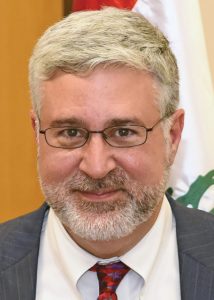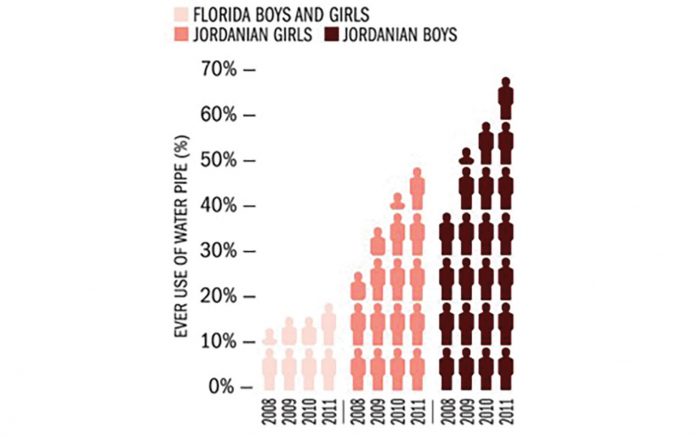Figure. Prevalance of Water Pipe Usage Is Virtually at Epidemic Proportion in Parts of the Middle East
Sources: Vardavas C, Filippidis F, Agaku I. http://tobaccocontrol.bmj.com. Accessed April 11, 2018. McKelvey KL, Wilcox ML, Madhivanan P, et al. Eur J Public Health. 2013;23(5):862-867. Florida Department of Health; 2012 Florida Youth Tobacco Survey. tobaccoatlas.org. Accessed April 11, 2018.)
By Fadlo R. Khuri, MD, FACP
Posted: June 2018
This lecture was delivered on the evening of February 23, 2018 at the 19th Lung Cancer Targeted Therapies Meeting. It is part of a series of annual talks given by senior leaders in the field of lung cancer research, about the field of thoracic oncology, their careers and the directions they have chosen. Previous speakers have included Paul Bunn and Larry Einhorn.
The courses of leadership and life are innately dynamic—one must adapt to circumstances while adhering to core principles to truly make a difference. I have been privileged to devote my career to understanding the biology of lung and aerodigestive cancers and to improving the prevention, treatment, and quality of life for patients with these diseases. This opportunity would never have been afforded to me without the American University of Beirut (AUB), the quintessential American institution of higher education abroad and a well-known liberal arts institution in the Middle East. Founded in 1866, the AUB has educated four generations of my family, so I was deeply honored—after my clinical research contributions and helping develop major programs at the University of Texas MD Anderson Cancer Center1,2 and Emory University’s Winship Cancer Institute3,4—to be selected in March 2015 to become the 16th president of AUB.
Global Contributions
In a region beset with instability and strife, AUB plays a critical role in the development of opportunities for tomorrow’s leaders amid these daunting challenges. Almost half of the world’s displaced persons live in the Middle East. War, deprivation, and estrangement are widespread. It is incumbent upon those who have been provided significant opportunities to help create them for others. I am confident that the time is ripe to develop and participate in a new Marshall Plan for education in the Middle East.5
 Dr. Fadlo R. Khuri
Dr. Fadlo R. Khuri
With a world-class leadership team and stabilized tuition fees and budgetary expenses, AUB has embarked on an aspirational voyage to create greater opportunities for some of the best and brightest individuals, many of whom would otherwise not have the ability to obtain college, medical, and postgraduate education. They will join our community of scholars and practitioners—a community that models a just, resilient, and relevant mini-society—dedicated to transforming the societies around us and improving the human condition through education, service, and research.
In the next 10 to 15 years, low-income counties will bear the vast majority of the cancer disease burden. Whereas U.S. smoking rates have fallen from 45% in 1965 to below 15%, smoking in the Middle East has done the opposite.7,8 Lebanon, in particular, has the third highest per capita smoking rate in the world. The use of the water pipe is epidemic in Lebanon, Jordan, and other Arab countries, such that some studies demonstrate that up to 70% of Jordanian youth have attempted the water pipe (Fig.).9
In this context, AUB has developed a comprehensive effort to make the campus tobacco-free by the start of academic year 2018-2019. We have also developed new National Cancer Treatment Guidelines for Lebanon, launched in February 2018, as a model for middle-income countries with broad disparities in wealth distribution. Through these and other measures, we intend to affect health and education, such that AUB’s motto, “That they may have life and have it more abundantly,” continues to apply to those most in need of our support. ✦
About the Author: Dr. Khuri is a professor in the Department of Hematology and Medical Oncology at Emory University School of Medicine. He is the 16th President of the American University of Beirut in Lebanon.
References:
1. Khuri FR, Nemunaitis J, Ganly I, et al. A controlled trial of intratumoral ONYX-015, a selectively-replicating adenovirus, in combination with cisplatin and 5-fluorouracil in patients with recurrent head and neck cancer. Nature Med. 2000;6(8):879-885.
2. Khuri FR, Wu H, Lee JJ, et al. Cyclooxygenase-2 overexpression is a marker of poor prognosis in stage I non-small cell lung cancer. Clin Cancer Res. 2001;7(4):861-867.
3. Sun SY, Rosenberg LM, Wang X, Zhou Z, Yue P, Fu H, Khuri FR. Activation of Akt and eIF4E survival pathways by rapamycin-mediated mammalian target of rapamycin inhibition. Cancer Res. 2005;65(16):7052-7058
4. Owonikoko TK, Ramalingam SS, Miller DL, et al. A Translational, Pharmacodynamic, and Pharmacokinetic Phase IB Clinical Study of Everolimus in Resectable Non-Small Cell Lung Cancer. Clin Cancer Res. 2015;21(8):1859-1868.
5. George C. Marshall and the Marshall Plan: A Model of Transformational Diplomacy. U.S. Department of State website. web.archive.org/ web/20050616023457/http://www.state.gov/r/pa/dc/rks/47848.htm. Accessed March 20, 2018.
6. World Health Organization. World health statistics 2016: monitoring health for the SDGs, sustainable development goals. Geneva, Switzerland: WHO Press; 2016.
7. Ng M, Freeman MK, Fleming TD, et al. Smoking prevalence and cigarette consumption in 187 countries, 1980-2012. JAMA. 2014;311(2):183-192.
8. Vardavas CI, Filippidis FT, Agaku IT. Determinants and prevalence of e-cigarette use throughout the European Union: a secondary analysis of 26 566 youth and adults from 27 Countries. Tob Control. 2015;24(5):442-448.
9. McKelvey KL, Wilcox ML, Madhivanan P, Mzayek F, Khader YS, Maziak W. Time trends of cigarette and waterpipe smoking among a cohort of school children in Irbid, Jordan, 2008-11. Eur J Public Health. 2013;5:862-867.











